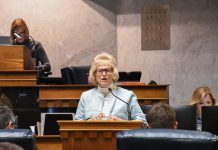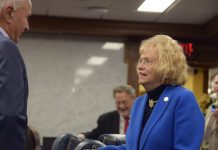Dave Stafford for www.theindianalawyer.com
A group advocating the legalization of marijuana that was denied permission to hold a rally at the courthouse in Lafayette won an injunction against the county in federal court.
Tippecanoe County may no longer enforce its policy on displays and events on government property, which it used to deny permission for a courthouse rally requested by Higher Society of Indiana Inc. That policy required events on the courthouse grounds to be sponsored and prepared by a department or office of county government and scheduled through the board of county commissioners.
Chief Judge Philip Simon of the U.S. District Court for the Northern District of Indiana wrote Higher Society was likely to prevail on its argument that the policy is an unconstitutional violation of the First Amendment. “During its argument, the County candidly admitted that the reason it did not sponsor the Higher Society’s rally was because it didn’t agree with the group’s message,†Simon wrote in an order issued Monday. Higher Society filed its lawsuit in June.
“The County argues that it may engage in viewpoint discrimination because activities and speeches that take place on the courthouse steps are ‘government speech’ that is not entitled to constitutional protection. … I think that the County’s argument stretches the concept of ‘government speech’ to its breaking point, and so the motion for a preliminary injunction will be granted,†Simon wrote.
Tippecanoe County adopted its policy in 1999 in an effort intended to make the courthouse grounds a “nonpublic forum†moving forward, Simon wrote. But he noted the county has approved use of the courthouse grounds by private groups such as the Fraternal Order of Police and League of Women Voters, even though the county doesn’t inquire into the content of messages the groups would convey. Likewise, the county doesn’t control what a group says once an event is sponsored.
Simon noted other groups have held rallies or events at the courthouse without first asking the county, deciding it’s “easier to beg for forgiveness than ask for permission.†Higher Society previously held a rally at the courthouse after a county employee said the group could on her mistaken belief that the commissioners had approved it.
These other events at the courthouse, whether sanctioned or not, are not government speech, Simon wrote, and passersby are unlikely to interpret them as such. “Rather, reasonable observers know that people who want to protest will find symbolic public property to do it on, and that, in many cases, the First Amendment guarantees them the right to march peacefully and make speeches there, even if the government doesn’t like what they are saying.â€
Tippecanoe County “has opened the courthouse grounds up to speech by some groups — the ones it likes — and, having done so, it may not now prohibit others from speaking on the basis of what they intend to say. Accordingly, the Higher Society has shown that it has a significant likelihood of
success on the merits,†Simon wrote.
The case, brought by the American Civil Liberties Union of Indiana, is Higher Society of Indiana, Inc. v. Tippecanoe County, Indiana, 4:16-cv-43.




